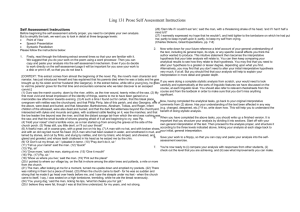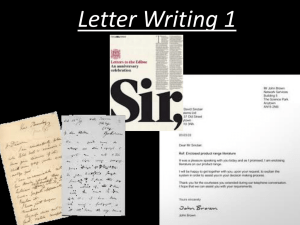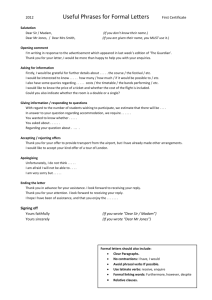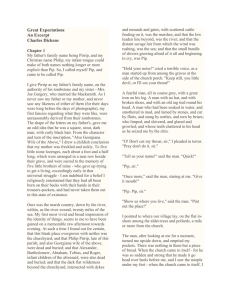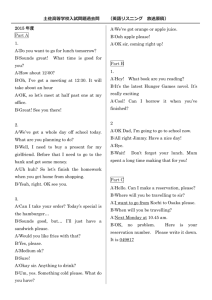Fiction before 1900 Great Expectations My father`s family name
advertisement
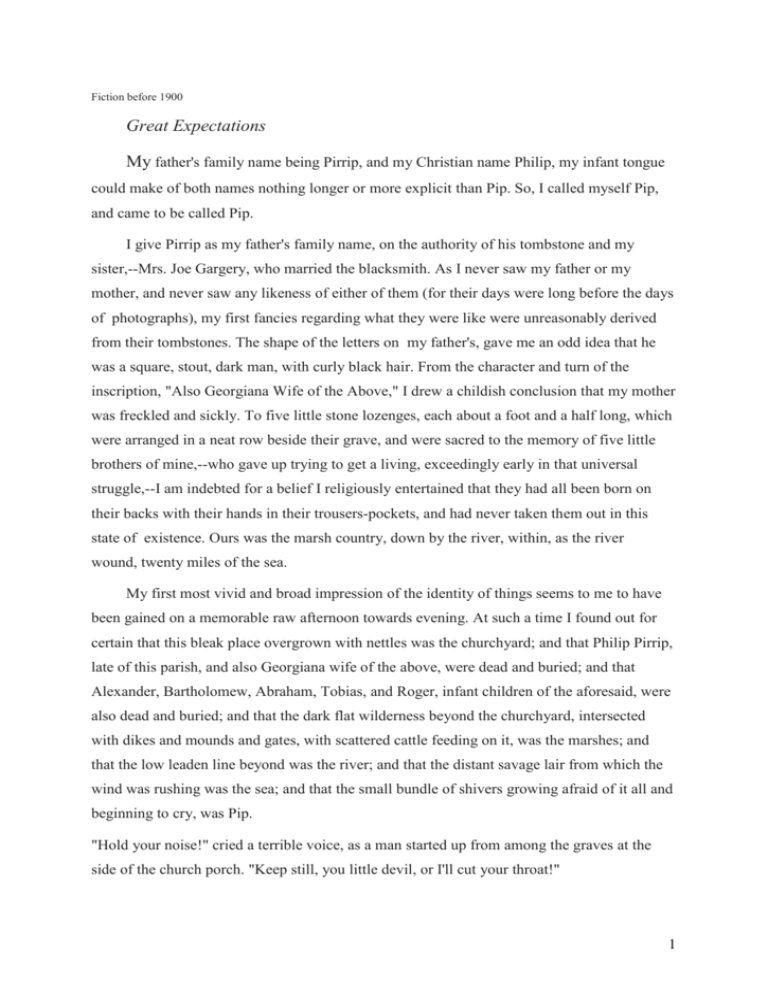
Fiction before 1900 Great Expectations My father's family name being Pirrip, and my Christian name Philip, my infant tongue could make of both names nothing longer or more explicit than Pip. So, I called myself Pip, and came to be called Pip. I give Pirrip as my father's family name, on the authority of his tombstone and my sister,--Mrs. Joe Gargery, who married the blacksmith. As I never saw my father or my mother, and never saw any likeness of either of them (for their days were long before the days of photographs), my first fancies regarding what they were like were unreasonably derived from their tombstones. The shape of the letters on my father's, gave me an odd idea that he was a square, stout, dark man, with curly black hair. From the character and turn of the inscription, "Also Georgiana Wife of the Above," I drew a childish conclusion that my mother was freckled and sickly. To five little stone lozenges, each about a foot and a half long, which were arranged in a neat row beside their grave, and were sacred to the memory of five little brothers of mine,--who gave up trying to get a living, exceedingly early in that universal struggle,--I am indebted for a belief I religiously entertained that they had all been born on their backs with their hands in their trousers-pockets, and had never taken them out in this state of existence. Ours was the marsh country, down by the river, within, as the river wound, twenty miles of the sea. My first most vivid and broad impression of the identity of things seems to me to have been gained on a memorable raw afternoon towards evening. At such a time I found out for certain that this bleak place overgrown with nettles was the churchyard; and that Philip Pirrip, late of this parish, and also Georgiana wife of the above, were dead and buried; and that Alexander, Bartholomew, Abraham, Tobias, and Roger, infant children of the aforesaid, were also dead and buried; and that the dark flat wilderness beyond the churchyard, intersected with dikes and mounds and gates, with scattered cattle feeding on it, was the marshes; and that the low leaden line beyond was the river; and that the distant savage lair from which the wind was rushing was the sea; and that the small bundle of shivers growing afraid of it all and beginning to cry, was Pip. "Hold your noise!" cried a terrible voice, as a man started up from among the graves at the side of the church porch. "Keep still, you little devil, or I'll cut your throat!" 1 A fearful man, all in coarse gray, with a great iron on his leg. A man with no hat, and with broken shoes, and with an old rag tied round his head. A man who had been soaked in water, and smothered in mud, and lamed by stones, and cut by flints, and stung by nettles, and torn by briars; who limped, and shivered, and glared, and growled; and whose teeth chattered in his head as he seized me by the chin. "Oh! Don't cut my throat, sir," I pleaded in terror. "Pray don't do it, sir." "Tell us your name!" said the man. "Quick!" "Pip, sir." "Once more," said the man, staring at me. "Give it mouth!" "Pip. Pip, sir." "Show us where you live," said the man. "Pint out the place!" I pointed to where our village lay, on the flat in-shore among the alder-trees and pollards, a mile or more from the church. The man, after looking at me for a moment, turned me upside down, and emptied my pockets. There was nothing in them but a piece of bread. When the church came to itself,--for he was so sudden and strong that he made it go head over heels before me, and I saw the steeple under my feet,--when the church came to itself, I say, I was seated on a high tombstone, trembling while he ate the bread ravenously. "You young dog," said the man, licking his lips, "what fat cheeks you ha' got." I believe they were fat, though I was at that time undersized for my years, and not strong. "Darn me if I couldn't eat em," said the man, with a threatening shake of his head, "and if I han't half a mind to't!" I earnestly expressed my hope that he wouldn't, and held tighter to the tombstone on which he had put me; partly, to keep myself upon it; partly, to keep myself from crying. "Now lookee here!" said the man. "Where's your mother?" "There, sir!" said I. He started, made a short run, and stopped and looked over his shoulder. "There, sir!" I timidly explained. "Also Georgiana. That's my mother." "Oh!" said he, coming back. "And is that your father alonger your mother?" "Yes, sir," said I; "him too; late of this parish." "Ha!" he muttered then, considering. "Who d'ye live with,--supposin' you're kindly let to live, which I han't made up my mind about?" "My sister, sir,--Mrs. Joe Gargery,--wife of Joe Gargery, the blacksmith, sir." "Blacksmith, eh?" said he. And looked down at his leg. From Charles Dickens’s Great Expectations, chapter I 2 Fiction before 1900 Pride and Prejudice IT is a truth universally acknowledged, that a single man in possession of a good fortune, must be in want of a wife. However little known the feelings or views of such a man may be on his first entering a neighbourhood, this truth is so well fixed in the minds of the surrounding families, that he is considered as the rightful property of some one or other of heir daughters. "My dear Mr. Bennet," said his lady to him one day, "have you heard that Netherfield Park is let at last?" Mr. Bennet replied that he had not. "But it is," returned she; "for Mrs. Long has just been here, and she told me all about it." Mr. Bennet made no answer. "Do not you want to know who has taken it?" cried his wife impatiently. " You want to tell me, and I have no objection to hearing it." This was invitation enough. "Why, my dear, you must know, Mrs. Long says that Netherfield is taken by a young man of large fortune from the north of England; that he came down on Monday in a chaise and four to see the place, and was so much delighted with it that he agreed with Mr. Morris immediately; that he is to take possession before Michaelmas, and some of his servants are to be in the house by the end of next week." "What is his name?" "Bingley." "Is he married or single?" "Oh! single, my dear, to be sure! A single man of large fortune; four or five thousand a year. What a fine thing for our girls! "How so? how can it affect them?" "My dear Mr. Bennet," replied his wife, "how can you be so tiresome! You must know that I am thinking of his marrying one of them." "Is that his design in settling here?" "Design! nonsense, how can you talk so! But it is very likely that he may fall in love with one of them, and therefore you must visit him as soon as he comes." "I see no occasion for that. You and the girls may go, or you may send them by themselves, which perhaps will be still better, for as you are as handsome as any of them, Mr. Bingley might like you the best of the party." 3 "My dear, you flatter me. I certainly have had my share of beauty, but I do not pretend to be any thing extraordinary now. When a woman has five grown up daughters, she ought to give over thinking of her own beauty." "In such cases, a woman has not often much beauty to think of." "But, my dear, you must indeed go and see Mr. Bingley when he comes into the neighbourhood." "It is more than I engage for, I assure you." "But consider your daughters. Only think what an establishment it would be for one of them. Sir William and Lady Lucas are determined to go, merely on that account, for in general you know they visit no new comers. Indeed you must go, for it will be impossible for us to visit him, if you do not." "You are over scrupulous surely. I dare say Mr. Bingley will be very glad to see you; and I will send a few lines by you to assure him of my hearty consent to his marrying which ever he chooses of the girls; though I must throw in a good word for my little Lizzy." "I desire you will do no such thing. Lizzy is not a bit better than the others; and I am sure she is not half so handsome as Jane, nor half so good humoured as Lydia. But you are always giving her the preference." "They have none of them much to recommend them," replied he; "they are all silly and ignorant like other girls; but Lizzy has something more of quickness than her sisters." "Mr. Bennet, how can you abuse your own children in such way? You take delight in vexing me. You have no compassion on my poor nerves." "You mistake me, my dear. I have a high respect for your nerves. They are my old friends. I have heard you mention hem with consideration these twenty years at least." "Ah! you do not know what I suffer." "But I hope you will get over it, and live to see many young men of four thousand a year come into the neighbourhood." "It will be no use to us, if twenty such should come since you will not visit them." "Depend upon it, my dear, that when there are twenty I will visit them all." Mr. Bennet was so odd a mixture of quick parts sarcastic humour, reserve, and caprice, that the experience of three and twenty years had been insufficient to make his wife understand his character. Her mind was less difficult to develop. She was a woman of mean understanding, little information, and uncertain temper. When she was discontented she fancied herself nervous. The business of her life was to get her daughters married; its solace was visiting and news. From Jane Austen’s Pride and Prejudice, chapter I 4
